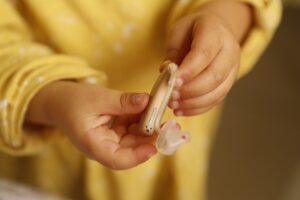Aiding pediatric cancer patients suffering from hearing loss
by Edg Adrian A. Eva, Reporter Hearing loss for children receiving cancer treatment is a difficult side effect—particularly during their formative years, when connecting with society is crucial to their development. “Many are unaware of the unattended side effects of these treatments, mainly irreversible hearing loss,” JP Mallo, I Want to Share Foundation (IWTS) Board […]

by Edg Adrian A. Eva, Reporter
Hearing loss for children receiving cancer treatment is a difficult side effect—particularly during their formative years, when connecting with society is crucial to their development.
“Many are unaware of the unattended side effects of these treatments, mainly irreversible hearing loss,” JP Mallo, I Want to Share Foundation (IWTS) Board of Trustee said in his opening statement during the turnover event.
In a 2023 study, Mr. Mallo noted that 30% to 50% of children who received platinum-based chemotherapy, such as cisplatin and carboplatin, developed hearing loss. At the Philippine General Hospital, this is more commonly observed among patients with brain tumors and osteosarcoma, a type of bone cancer.
To bridge the gap, ten pediatric cancer patients from the Philippine General Hospital (PGH) received hearing aids on October 29, in a turnover ceremony led by the I Want to Share Foundation (IWTS) in partnership with Manila Hearing Aid.
An additional twenty hearing aids will also be provided to other selected pediatric patients at PGH in the near future.
This initiative is part of PGH’s survivorship program, according to Dr. Ana Patricia Alcasabas, a pediatric oncologist at PGH. It was developed as more children have survived cancer since the early 2010s, in partnership with community organizations and non-government groups, to address the long-term effects of cancer treatments, such as hearing loss.
“We want to move for the children to integrate them (back) in their schools, families, and develop them careers… They do have a disability like hearing loss, (but) we want to help them overcome it,” Ms. Alcasabas said.
Each hearing aid is personalized for every patient, depending on the size of their ears and the severity of the hearing loss, which takes at least three months to develop, Sheila Marie B. Romero, founder of IWTS told BusinessWorld.
For patients like 7-year-old Rome, a two-year cancer survivor diagnosed with Grade 4 Medulloblastoma (a highly malignant and fast-growing type of brain tumor), receiving a hearing aid could help him return to school, as both of his ears were severely affected by some of his cancer treatments.
“Kanina no’ng nabigyan kami niyan (hearing aid) sobrang naiyak talaga ako. Kasi mahina lang yung boses ko, (tapos) tinanong ko siya kung naririnig na niya ako? Naririnig niya ako, sumagot po siya [Earlier, when we were given the hearing aid, I was crying because I asked him in a soft voice if he could hear me, and he said yes],” Michelle Teodocio, mother of Rome told BusinessWorld.
Meanwhile, for 8-year-old Lance, who is still undergoing chemotherapy to complete eight cycles for the same Grade 4 Medulloblastoma, receiving a hearing aid could help him enjoy his favorite music and videos on his mom’s smartphone.
“Super thankful din po kami na napili siya na mabigyan kasi parang mahina rin po yung kanan niya kahit pang-apat pa lang po namin (cycle) [We are also very thankful that he was chosen to receive it because his right ear seems to be losing hearing, even though it is only our fourth cycle],” Anna Joy Dela Cruz, mother of Lance said.
IWTS Founder, Ms. Romero, told BusinessWorld that after the initial distribution of thirty hearing aids to pediatric cancer patients at PGH, the foundation will continue to provide hearing aids to more patients in the future, reinforcing its commitment to supporting the lives of young cancer survivors.
















